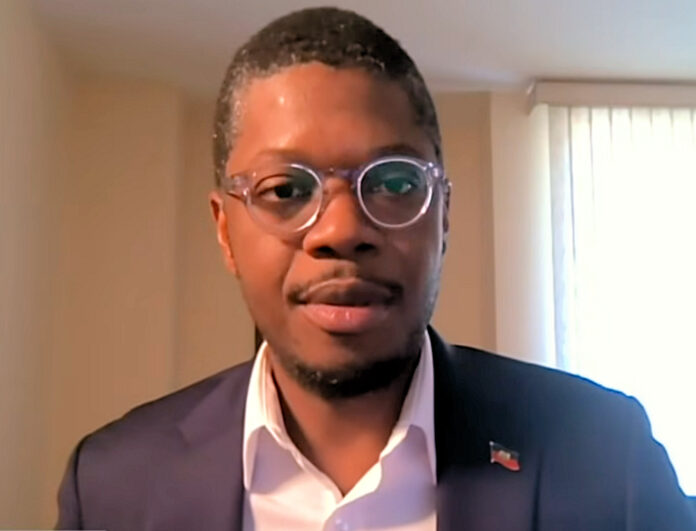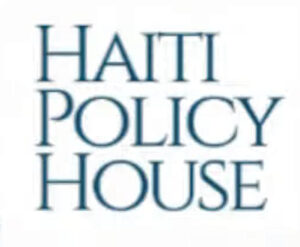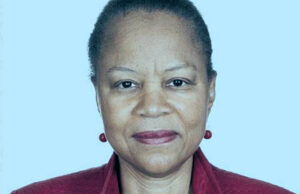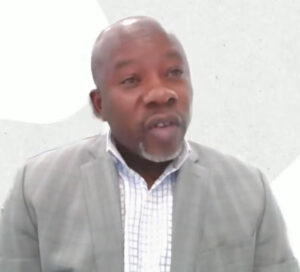
Washington has found a new “Haitian” partner in its efforts to manufacture consent for U.S. foreign policy in Haiti.
Haiti Policy House (HPH) is a Washington, DC-based organization founded one year ago by Wolf Paramphil, a graduate of the City University of New York, who has previously worked for the U.S. Commerce Department.
On its website, HPH purports to be “leading the global discussion on Haiti” as “the first research institute founded and run by Haitians and Haitian Americans.” It also boasts that it is “promoting sustainable, research-based solutions” and “serves as a vital meeting place for experts, researchers, and advocates focused on Haiti.”

In reality, with backing from the U.S. State Department (DoS) and in collusion with the International Monetary Fund (IMF) and World Bank, Paramphil and HPH eagerly produce propaganda and analysis designed to influence public opinion into alignment with Washington’s imperialist goals in Haiti.
HPH’s U.S. and Haitian Government Connections
In April, the new HPH “think tank” trumpeted its forming a “groundbreaking” partnership with the Jack D. Gordon Institute for Public Policy (JGI) at Florida International University (FIU).
The HPH press release neglects to mention that FIU’s JGI is an integral part of DoS’s Diplomacy Lab, “a public-private partnership between the Department of State and more than 60 U.S. academic institutions.” Launched in 2013, Diplomacy Lab “leverages university students and faculty experts to conduct open-source research on foreign policy challenges pertinent to bureaus across DoS,” according to its website.
HPH is also partnered with Washington’s current puppet government in Haiti through the Center for Planning Techniques and Applied Economics (CTPEA), whose president is the Haitian Minister of Planning and External Cooperation (MPCE), “to facilitate research, training, and collaboration.”
The MPCE is currently led by Ketleen Florestal, who believes that her ministry needs to be audited and restructured due to “abuses” by staff. Her predecessor, Aviol Fleurant, is under investigation by Haiti’s Unit for the Fight against Corruption (ULCC) for allegedly stealing millions in State funds.
Florestal relies on the United Nations Development Program (UNDP) to help address weak governance, and one of her first acts in office was to meet with the IMF and World Bank to consolidate Haiti’s “financial stability.”

HPH recently published their first annual review of their perceived accomplishments, noting that they shared “expertise and key insights” with, among others, the DoS, the U.S. government-funded United States Institute for Peace (USIP), the IMF, the Canadian government, the Dominican government, and, of course, the Haitian government.
Given its pedigree and focus, it is not surprising that HPH has received attention from the mainstream media like the New York Times, the BBC, and TRT.
HPH Straddles Washington’s Duopoly
Dr. Gloria C. Blaise, HPH’s Research Development Director, explained in a virtual debate posted about one year ago that HPH is a “non-partisan organization.”
Paramphil went further in an interview with the Think Tank Insights podcast: “Haiti Policy is like a hub, and I think there aren’t that many places that are neutral in the Haitian space,” he proclaimed.
“I don’t care if you’re a Republican, I don’t care if you’re a Democrat in the U.S.,” he said. “I don’t care what policy you vote for, if it is to help Haiti, you’re welcome to the table.”
Paramphil’s equating of non-partisanship with “neutrality” is telling. Any anti-imperialist knows that the Republican and Democratic parties are virtually indistinguishable in their support of U.S. foreign policy objectives, both supporting every war or intervention.

Therefore, Paramphil’s chest beating that he didn’t “pick a side” in the debate around Haiti’s fourth foreign military intervention last year is absurd. “One of the first challenges that we had when we first launched is that people wanted us to pick a side,” he explained. “When they announced the UN Mission, people wanted us to stand strongly against it or strongly for it, and I didn’t buckle.”
Of course, Paramphil did completely “buckle” by not clearly opposing the UN-blessed Multinational Security Support Mission (MSS), which has currently deployed just over 1,000 foreign police officers in Haiti in violation of the Haitian Constitution and UN Charter. The mission, which effectively end-runs the UN Security Council, was concocted by Antony Blinken’s State Department, is carried on by Marco Rubio’s, and continues to be mostly U.S.-funded.
Any true Haitian nationalist or anti-imperialist strongly condemns the mission. Paramphil sets up a false dichotomy when he conflates not “picking a side” on the intervention with “neutrality” in dealing with the two parties of the U.S. duopoly.
Had HPH challenged the MSS’s legitimacy, they surely would have lost their partnership with the State Department’s Diplomacy Lab at FIU and their access to “connections in very high places.”
“We have connections in very high places”
Paramphil views the connections HPH has to people “in very high places” to be his organization’s main advantage. HPH is also located only a few blocks away from the White House.
“There are things that are more important than money, and one of them is connections in foreign affairs and foreign policy,” he argues.
“When people reach out to me and ask ‘hey how can I help you?,’ they’re always surprised when I don’t say money,” he continued. “I’m like ‘hey, connect me to who you know’ because when we do publish a report, we send it to those people, and right now we have connections in very high places.”
Paramphil sets up a false dichotomy when he conflates not “picking a side” on the intervention with “neutrality” in dealing with the two parties of the U.S. duopoly.
The admission that funding is not a problem for HPH is remarkable considering his organization is only one year old. It is undoubtedly one of the benefits enjoyed by those who partner with the State Department.
Haiti Policy House’s tacit approval of U.S. imperialist policies
Paramphil’s June 2024 discussion with Congresswoman Sheila Cherfilus-McCormick (D-FL) provided an example of how HPH navigates access to those in power.
Their discussion centered on Cherfilus-McCormick’s “Louverture Resolution,” in which she promises to “help to rebuild Haiti through a 10-year, $50 billion development program,” calling it a new “Marshall Plan for Haiti.”
The resolution has since evolved into proposed legislation called the “L’Ouverture Economic Development Plan for Haiti Act of 2025.” With Trump’s reelection, the likelihood of this proposed legislation becoming law is unlikely.
Nonetheless, it is worth noting that Cherfilus-McCormick’s Louverture Resolution is tied to the centerpiece of Washington’s foreign policy towards Haiti: the Global Fragility Act (GFA).
Section 3 of the Louverture Act states that one of its purposes is to establish “an economic environment conducive for an accountable, transparent, and sustained democratic system of governance in Haiti, inclusive for its people, in coordination with the Global Fragility Act of 2019.”
The GFA is currently awaiting reauthorization under bipartisan legislation introduced by House Foreign Affairs Committee Chairman Michael McCaul (R-TX) and Rep. Sara Jacobs (D-CA).
This bipartisan support is not new. The GFA was passed into law by Trump in 2019 with full bipartisan support, including Congresswoman Ilhan Omar (D-MN).
The GFA follows the “2017 National Security Strategy” that will work to “strengthen” so-called “fragile states… where state weakness or failure would magnify threats to the American homeland” by allowing them to develop diplomatic and economic relationships with Russia and China.
The GFA focuses on how “fragile states” affect U.S. geo-strategic concerns, including access to raw materials. The act was framed by its proponents as “an opportunity to drive the necessary change” that would prevent “adversaries such as China and Russia to expand their influence.”
The U.S. government selected Haiti to be the first “partner” under the GFA. Next would come Libya, Mozambique, and Papua New Guinea, along with West Africa’s Benin, Côte d’Ivoire, Ghana, Guinea, and Togo.
The Louverture Act also aims to improve Haiti’s security by “supporting the goals of the U.S. Strategy to Prevent Conflict and Promote Stability 10-Year Plan for Haiti report, a derivative of the Global Fragility Act of 2019.”
The Strategy to Prevent Conflict and Promote Stability(SPCPS) outlines a plan to deploy 10-year “security-assistance” (i.e. U.S. soldiers) to its “partners.”
Considering the GFA’s importance in U.S. foreign policy towards Haiti, it is striking that neither it nor the SPCPS are even mentioned in the hour-long interview between Paramphil and Cherfilus-McCormick nor any of HPH’s research papers.
This omission is not an oversight. It is a necessary evasion for an organization that wants to maintain its partnership and “access to people in very high places” in Washington.
While HPH’s homepage states in bold that their goal is “Empowering Haiti Through Strategic Foreign Policy,” one need only read the first line of their recent publication by Ervens Jean-Pierre, HPH’s Senior Policy Analyst of Governance and Global Policy, to understand why the organization is a DoS partner.
The pedantic, inconsequential debate between Backer and Celestin ended with both agreeing that Haiti needed a “political solution”
“For decades, U.S. foreign policy toward countries like Haiti have (sic) been guided by the idea of promoting democracy, development, and human rights.”
This opening line could have been written by a State Department official. Anyone even casually familiar with U.S. foreign policy in Haiti understands that Washington has consistently undermined Haiti’s democracy and violated its sovereignty through coups d’état, military occupations, rigged elections, funding of paramilitaries, and political meddling through various governmental and “non-governmental” organizations like the National Endowment for Democracy (NED) and U.S. Agency for International Development (USAID).
Manufacturing consent for U.S. foreign policy
HPH also manufactures consent for U.S. foreign policy in Haiti by organizing circumscribed debates. As Noam Chomsky explained: “the best way to control public opinion is, in fact, to promote vigorous debate. You set the limits of the debate, showing what the most extreme acceptable opinions are and then allow and encourage debate within those limits.”
This was the approach used in the aforementioned debate moderated by HPH’s Gloria C. Blaise one year ago with the selected guests having “acceptable” outlooks.
The debate was focused on the “imminent establishment” of the Washington-imposed Transitional Presidential Council (TPC). Although most Haitians opposed it, HPH in its Youtube description claimed that the TPC was “seen by many as the best solution to grapple with the country’s multipronged crisis.”
The two guest debaters were well within the narrow parameters needed to align with Washington’s foreign policy in Haiti i.e. the installation of Washington-approved de facto government and the MSS’ deployment.

On one side was Firmin Backer, the co-founder of Haiti Renewal Alliance (HRA), which was a partner of the now-disbanded USAID, the United Nations, and the cellphone giant Digicel (also partnered with USAID). HRA also works with Vistant, an NGO that recently rebranded itself from its former name of PM Consulting Group(PMCG). According to a PMCG program manager, the group has “worked in virtually every sector funded by USAID,” including a 2022 contract totaling $95 million to provide “Smart Development and Promote Diversity, Equity, and Inclusivity” to USAID. In short, it’s clear that HRA in no way challenges U.S. interests in Haiti.
Indeed, on its website, the HRA promotes neoliberal solutions for Haiti such as “sustainable business development and investment” as well as Cherfilus-McCormick’s GFA-based “Louverture Resolution.”
The debate’s “other side” was Johnny Celestin, who has had several roles in NGOs related to Haiti and worked as Deputy Chief of Staff for the Planning and External Cooperation Minister under President Michel Martelly.
Celestin also worked as the “Diaspora liaison“ at the Clinton Foundation following the devastating earthquake that struck Haiti in 2010. In a 2011 Rolling Stone interview,Celestin said that “Bill Clinton is the most powerful advocate that Haiti is ever going to have,” insisting that Haitians “can’t let this opportunity pass” to get support from the Clintons. He was referring to Clinton’s disastrous leadership in rebuilding Haiti following the earthquake by heading the Interim Haiti Recovery Commission (IHRC) that was formed to collect and disperse money for Haiti’s reconstruction. Celestin’s view that the Clinton’s were “powerful advocates” for Haiti is in direct contradiction to the view of most Haitians, who generally revile them. Bill Clinton helped destroyed Haiti’s rice farming sector, for which he apologized, while Hillary Clinton’s State Department engineered Michel Martelly’s election win by intervening in Haiti’s sovereign polling.

A firm called MDA Analytics LLC, run by ex-federal criminal investigators who drew on whistleblower testimony, alleges that the Clinton Foundation “engaged in illegal activities and may be liable for millions of dollars in delinquent taxes and penalties.”
The IHRC’s reconstruction efforts include providing structurally unsafe classroom trailers that were laced with formaldehyde and evicting hundreds of poor farmers so sweatshops could be constructed in Caracol. They promised 100,000 textile assembly jobs, but barely 8,000 jobs were created. Celestin also spoke at a 2022 event hosted by the NED where guests, most of whom led NED-funded organizations, endorsed the GFA.
The pedantic, inconsequential debate between Backer and Celestin ended with both agreeing that Haiti needed a “political solution,” a vague formulation that side-stepped the key issue: that Haiti’s “political solution” was being imposed by Washington through their proxies in CARICOM, and Haiti’s Constitution was being trampled because all TPC members had to agree to the MSS.
When Dr. Blaise concluded by asking the debaters “what can the diaspora do?”, Celestin offered the neoliberal cliche: diaspora Haitians, “put your money where your mouth is.”
Backer meanwhile explained his view that Haitians in the diaspora are largely uninformed about U.S. foreign policy in Haiti.
What did HPH provide their viewers with this debate? The veneer of the seemingly vigorous debate (which ignored obvious red-lines about Haitian sovereignty and democracy violated by the TPC), while never revealing that the debaters are deeply involved with the U.S. government.
Paramphil aligns with other neoliberal funded groups and belittles 2004 coup
It is not surprising that Paramphil’s HPH aligns with other Haitian NGOs funded by NED and globalist financier George Soros’ Open Society Foundations (OSF).
For example, in a 2024 interview, Paramphil heaps praise on Policité, another Haitian “think tank.” Policité was founded with funds from NED and OSF by prominent Petrochallenger Emmanuela Douyon, who openly supports the GFA.
In another telling interview with former Haitian Prime Minister Michelle Duvivier Pierre-Louis, Paramphil described the kidnapping/coup against President Jean-Bertrand Aristide by U.S. forces in 2004 as an “exit.”
He also ignored Pierre-Louis’ small but significant role in spreading anti-Aristide and anti-Lavalas propaganda leading up to the coup.
Pierre-Louis founded FOKAL, an organization funded by the OSF, which has been accurately described as “NATO’s soft-power arm” by journalist Mike Benz. Pierre-Louis supports neoliberal reforms and once thanked Hillary Clinton for “her personal commitment and that of the United States” to Haiti.
Another wolf in sheep’s clothing
In short, HPH is yet one more attempt to put a Haitian face on Washington’s control of the narrative on Haiti by funding organizations compliant with their foreign policy goals there.
Wolf Paramphil and the HPH cannot be trusted to fulfill their mission to “drive impactful foreign policy toward Haiti through strategic research, dialogue, and collaboration.” The record is clear that they serve the U.S. State Department and Washington’s bipartisan foreign policy goals in Haiti by generating propaganda that defends the outlook and interests of the U.S. empire, not the Haitian masses.
Travis Ross is a teacher based in Montreal, Québec. He is also the co-editor of the Canada-Haiti Information Project at canada-haiti.ca. Travis has written for Haiti Liberté, Black Agenda Report, The Canada Files, TruthOut, and rabble.ca. He can be reached on X.









